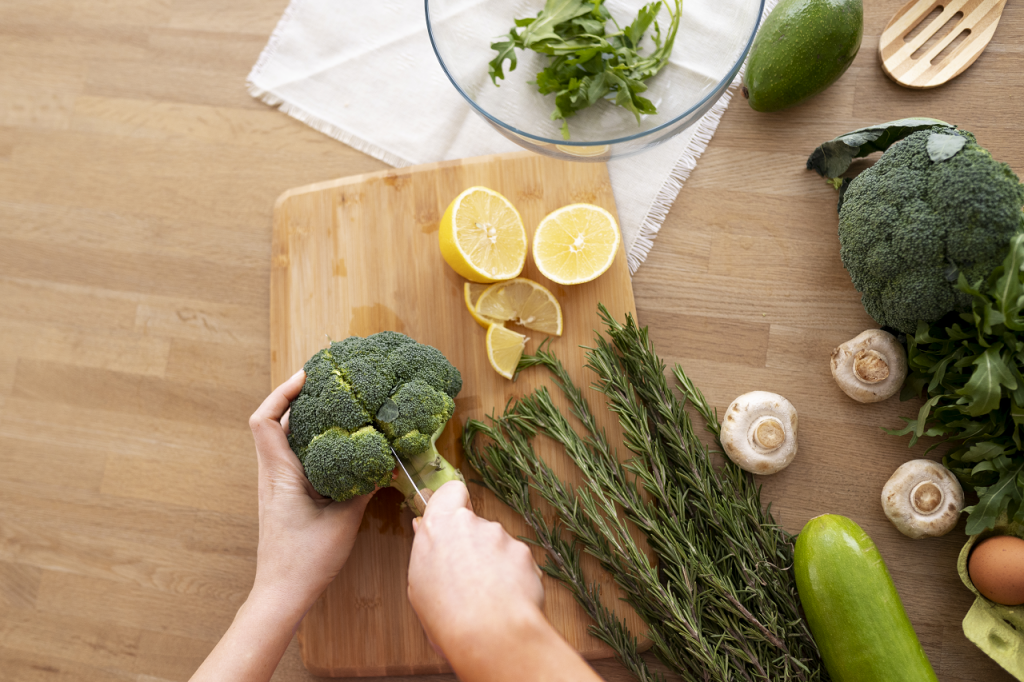Embark on a nourishing journey with our in-depth guide on vitamins for vegetarians. This article unveils the essential vitamins and minerals crucial for a thriving vegetarian lifestyle. Whether you’re a seasoned veggie enthusiast or new to plant-based eating, our guide is tailored to ensure you don’t miss out on vital nutrients.
Vitamins for vegetarians: Why is it important?
While a well-balanced vegetarian diet can be a nutritional powerhouse, certain crucial vitamins for vegetarians are primarily found in animal products. Additionally, some plant-based versions might have lower absorption rates. Understanding these gaps empowers you to bridge them with smart food choices and, when necessary, well-informed vegetarian vitamin supplements.
Essential Vitamins for Vegetarians:
1. Vitamin B12:
The king of energy production, B12 fuels red blood cell formation, oxygen transport, and nervous system function. Vegetarians typically lack dietary B12, making daily supplementation crucial (1000 mcg). Choose sublingual or chewable forms for optimal absorption.
Food Sources: Fortified plant milk, nutritional yeast, tempeh, fortified cereals.
2. Iron:
This oxygen-carrying champion delivers vital fuel to your muscles, powering your activities from leisurely strolls to intense workouts. Plant-based iron exists, but absorption is lower. Pair iron-rich foods like lentils and tofu with vitamin C (think citrus fruits!) to significantly boost absorption.
Food Sources: Lentils, tofu, tempeh, quinoa, beans, fortified cereals, dark leafy greens (with vitamin C!).
Curious to discover more? Dive deeper with our additional insights here.
3. Vitamin D: The Sunshine Vitamin for Vegetarians
The sunshine vitamin acts like a hormone, regulating calcium absorption and influencing muscle function and immunity. While sun exposure helps, vegetarians often require additional support, especially during winter months. Choose a plant-based D3 supplement (2000 IU daily) to stay topped up.
Food Sources: Fortified plant milk, mushrooms exposed to UV light.
4. Omega-3 Fatty Acids:
These brain and heart health superstars also reduce inflammation and support muscle recovery. While plant-based sources like chia seeds offer ALA omega-3s, the conversion to the active forms is inefficient. Consider an algae-based DHA/EPA supplement (1000-2000 mg daily).
Food Sources: Chia seeds, walnuts, flaxseeds, algae oil.
5. Calcium:
The bone builder, calcium plays a vital role in strong bones and teeth. Leafy greens and fortified plant milks are good sources, but vegetarians might benefit from additional vegetarian calcium supplements (500-1000 mg daily), especially if dairy intake is limited.
Food Sources: Leafy greens (kale, collard greens), fortified plant milk, tofu, tempeh.

Beyond Vitamins: The Holistic Vegetarian
- Protein: Building and repairing tissues is essential for everyone. Vegetarians can easily meet their protein needs by incorporating legumes, nuts, seeds, and soy products into their diet. Consider protein powder supplements for convenience and recovery support, especially after strenuous activities.
- Gut Health: A healthy gut microbiome translates to better nutrient absorption and immune function. Prioritize gut-friendly fermented foods like sauerkraut and kimchi, and consider a probiotic supplement to support gut health.
- Iodine: This essential mineral plays a crucial role in thyroid function and metabolism. Seaweed, iodized salt, and fortified plant milks are good sources. Consult your doctor to determine if additional iodine supplements are necessary.
- Zinc: This mineral participates in numerous bodily functions, including immune responses and wound healing. Plant-based sources include pumpkin seeds, tofu, and tempeh. Consult your doctor for zinc level checks and potential vegetarian zinc supplements, if needed.
What vitamins vegetarians should take: Finding the Best
- Read labels carefully: Look for vegan-certified vitamin supplements for vegetarians free from animal-derived ingredients.
- Consult your doctor or a registered dietitian: Discuss your individual needs and potential interactions with medications.
- Choose reputable brands: Opt for brands with third-party quality certifications for purity and potency.
- Dosage matters: Follow recommended dosages and avoid exceeding the daily intake limit of your vegetarian vitamin supplements.
Remember, supplements are meant to complement a healthy diet, not replace it. Prioritize a balanced vegetarian meal plan rich in fruits, vegetables, whole grains, legumes, and nuts.
Seeking the Ideal Multivitamin for Vegetarians? Read more here.
Hidden Vitamins for Vegetarians
Beyond essential vitamins, a treasure trove of nutrients awaits in your plant-based pantry. These “hidden gems” offer an extra level of nutritional support and enrich your vegetarian journey with vibrant benefits:
1. Vitamin K: Often overshadowed by its sunshine sibling, vitamin K plays a crucial role in bone health and blood clotting. Leafy greens like kale and spinach are champions, but consider adding parsley, broccoli, and Brussels sprouts for a diverse K-boost.
2. Folate: This key player in cell growth and division is vital for pregnant women and anyone looking to conceive. Lentils, chickpeas, asparagus, and fortified cereals are your folate friends. Remember, adequate folate intake before and during pregnancy can help prevent birth defects.
3. Manganese: This essential mineral supports energy production, metabolism, and antioxidant function. Whole grains, nuts, seeds, and leafy greens are your manganese mines. Soak and sprout nuts and seeds for enhanced absorption.
4. Selenium: This trace mineral acts as a powerful antioxidant, protecting cells from damage and supporting thyroid function. Brazil nuts are the undisputed selenium superstars, with just one nut packing almost your daily requirement! Include mushrooms, tofu, and lentils for additional selenium bounty.
5. Phytochemicals: These colorful non-nutrient compounds found in plants offer a kaleidoscope of health benefits. Think antioxidants, anti-inflammatory properties, and even cancer-fighting potential. Embrace berries, peppers, cruciferous vegetables (like broccoli and cabbage), and turmeric to unlock the power of phytochemicals.
Maximizing Nutrient Intake for Vegetarians
- Variety is key: Embrace a rainbow of fruits and vegetables across the color spectrum to maximize your intake of diverse nutrients.
- Cooking methods matter: Opt for steaming, stir-frying, or lightly boiling to preserve precious vitamins and minerals.
- Sprouts and fermentation: Sprouting nuts, seeds, and legumes enhances nutrient bioavailability. Fermented foods like sauerkraut and kimchi boost gut health and nutrient absorption.
- Plan, prep, and pack: Meal prepping ensures healthy options are readily available, preventing unhealthy choices fueled by convenience.
Remember, a well-planned vegetarian diet can be a nutritional powerhouse brimming with essential vitamins, minerals, and hidden gems. By following these tips and incorporating the mentioned nutrient-rich foods, you can optimize your health and thrive on a vibrant plant-based journey.
More Than Just Vitamins for Vegetarians
While optimizing your nutrient intake is crucial, your vegetarian journey extends beyond a plate of food. Remember:
- Hydration: Water is the foundation of life. Aim for eight glasses daily to ensure optimal body function and nutrient absorption.
- Exercise: Physical activity is essential for overall health and well-being. Find an activity you enjoy, from brisk walks to dancing, and get your body moving.
- Stress management: Chronic stress can wreak havoc on your health. Practice relaxation techniques like yoga, meditation, or spending time in nature to manage stress and support your well-being.
- Sleep: Prioritize 7-8 hours of quality sleep each night for optimal physical and mental recovery. Establish a regular sleep schedule and create a relaxing bedtime routine.
In conclusion, understanding and incorporating these “vegetarian vitamins” is essential for a successful vegetarian lifestyle. Embrace this journey with the right knowledge and choices, ensuring a balanced and healthy diet.
This concludes the article on ‘Essential Vitamins For Vegetarians’. We hope it’s been helpful for you. Remember, at Vegetarian Protein, we specialize in sports supplementation for vegetarians. Feel free to return whenever you have doubts or need a product.



